What should I do if my newborn has eczema on his face?
It can be said that eczema on the face of newborn babies is a very normal situation, clinically almost 80% of babies have eczema, just the degree is not the same. Although eczema is a recurring disease, but do not worry too much, after a year about half of the baby can be relieved by themselves, or after appropriate medication can also be relieved. However, less than one-third of babies will still have eczema when they grow up.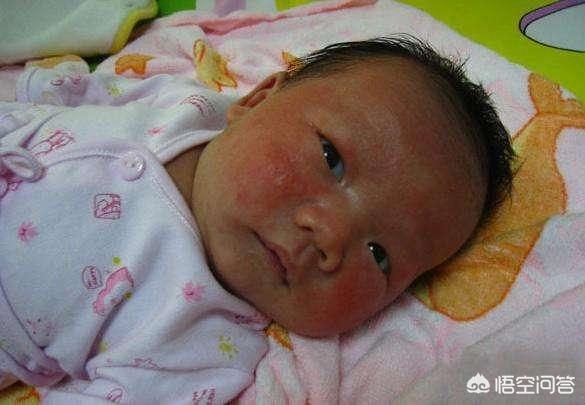
What to do if your newborn has eczema on his face
The cause of eczema is not completely clear. Some say it is genetic, others say it is related to the baby's skin is not well developed. However, some babies have eczema while others do not, which means there is still a difference. As for heredity, there is a theory that there is a special protein in the skin called dermatofilament polyprotein, and when there is a mutation in this protein, the skin will be drier and prone to eczema.
Whatever the cause, care is important. And care can account for 70% of the importance compared to medication, with treatment only accounting for 30%.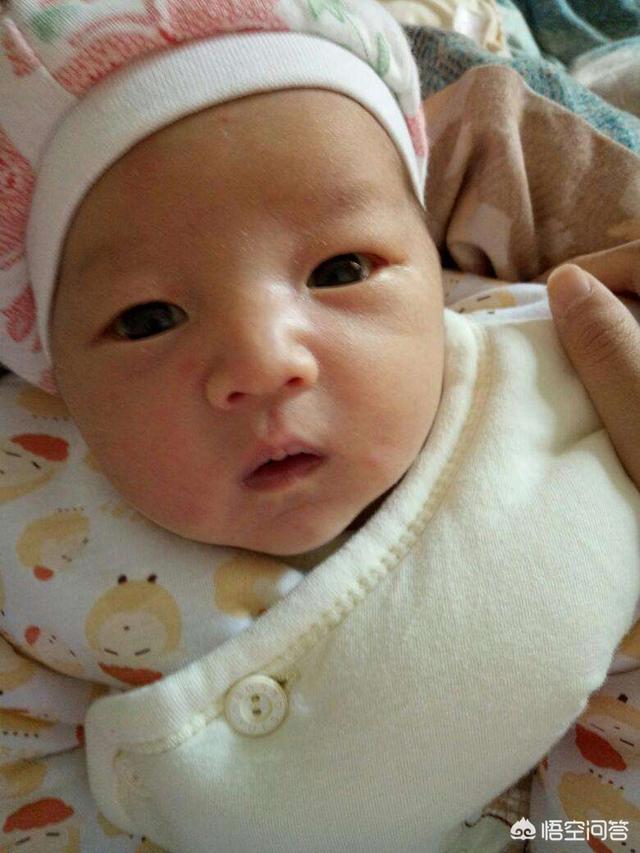
Daily Care:first of allKeep your baby's skin dry and cool.Neither overly dry nor apply too much additive moisturizer. Secondly, eczema flare-ups are very itchy, and this is when you should cut your baby's nails regularly.Prevent scratching the skin and developing secondary infections. It is also necessary to let the babyAvoid external stimuli, pay attention to the changes of hot and cold temperature and humidity as well as don't let your baby wear clothes that are easy to irritate the skin, such as wool, silk, nylon and so on. This is very helpful in relieving your baby's eczema.
medication: The main thing with medication is to chooseHormone-free products. To be honest, there are many medications or skin care products on the market that claim to be able to treat baby eczema, but the real effect is really doubtful. And those really fast-acting, effective drugs, most of them contain hormones, once stopped eczema may come back again. It is best to use medication under the guidance of a doctor.
What should I do about eczema on my newborn's face? What can I put on it to get rid of it?
Baby eczema mostly occurs in the baby born about 1 month, mainly concentrated in the face, the symptoms of redness of the skin, with the size of a needle tip rash, eczema severe oozing, crusting as well as vesicles, crusting the skin after the red marks and a small amount of phosphorus flakes.
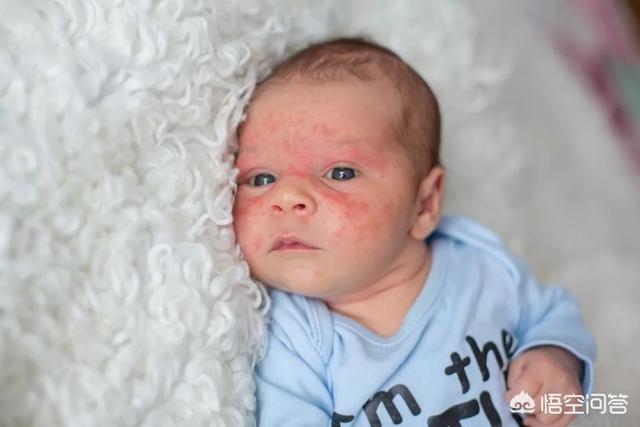
My good friend's son also has eczema, after the month out of the child to take the child to see the doctor, and then the doctor prescribed some ointment for the child to apply, because the baby ointment does not contain hormones, so the eczema on the child's face has been recurring. Then my friend took her child to a mom and pop store to swim and asked the people there to help apply some eczema creams, but it still didn't work.
Later, a friend introduced me to a rural doctor who prescribed a yellowish powder, which I mixed with water and applied a few times.
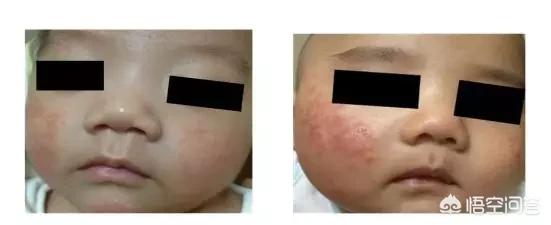
Of course, this is a local method, I do not know if it is useful for other babies, my own baby eczema at that time was not serious, I think the baby eczema wipe ointment to treat the symptoms of eczema is not the root cause of the problem, or to pay attention to the following aspects:
1. When a breastfed baby gets eczema, the mother must not eat spicy food;
2. Don't wash your baby's face and head with hot water and soap;
3. Eczema baby's skin is very itchy, to give the baby diligently cut nails, avoid scratching the face.
4. Keep baby's skin moisturized by applying a little baby lotion after cleaning the face.

These are my answers, I hope they help you!
Hello, I'm Xi mom, a multi-platform self-media person, dedicated to 0-6 years old parenting knowledge sharing, if you have parenting confusion, welcome to pay attention to, leave a message oh!
Some babies get newborn eczema, which is not a big deal, but it can be annoying for new moms.
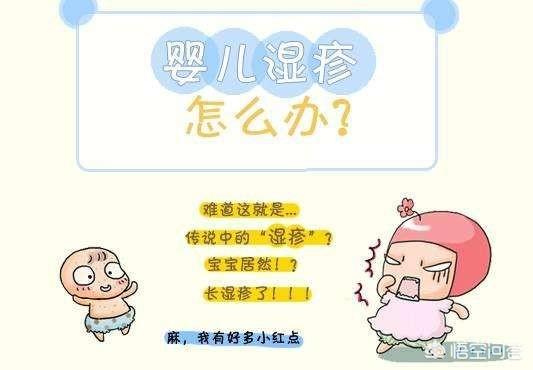
- At first, eczema appears as small red pimples or red spots, and as the condition worsens, blisters and pustules may appear on the baby's skin.
- Also at first eczema appears mainly on the cheeks, forehead, and jaw area of the newborn, and eventually it can extend to the baby's chest and limbs.
- Eczema can cause intense itching, making babies cry and irritable often, and in fact, flare-ups at night can interfere with a baby's sleep
Causes of neonatal eczema:
1. Heredity Heredity is also the main cause of eczema in babies, if the parents have eczema, the chances that the baby will get eczema will be very high;
2. External factors, old newspapers and magazines and other easy to collect dust, and stall toys pets these will cause baby eczema;
3. Some artificially fed babies are also prone to milk allergies, which can also cause eczema, so it is important to choose for your baby, a specialized hypoallergenic formula.
How to care for eczema in newborns:
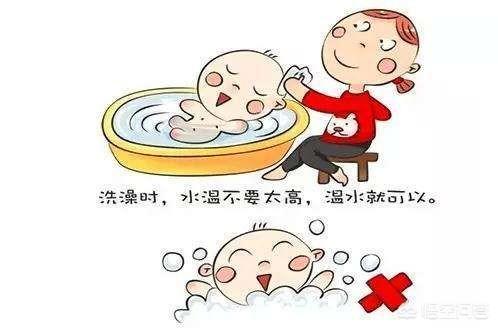
1. Diet
It is best to breastfeed, and if your baby is allergic to breast milk, you should abstain from eating fish, shrimp, crab and other, allergy-inducing foods.
2. Clothing
The baby's clothes, bedding must be cotton, breathable, to ensure comfort, softness, but also must be loose, suffering from eczema baby clothes can not wear too much, clothes wear too much baby easy to sweat, which will aggravate the baby's eczema.
3. Environment
The temperature of the room of the baby with eczema should not be too high, should not be carpeted, the unity must be ventilated in time, when cleaning, be careful to avoid dust.
4. Wash your face
To not use hot water and soapy water to wash and bathe your baby's face, wash and bathe can use warm water and skin acidic toiletries to clean your baby's skin and avoid cross infection.
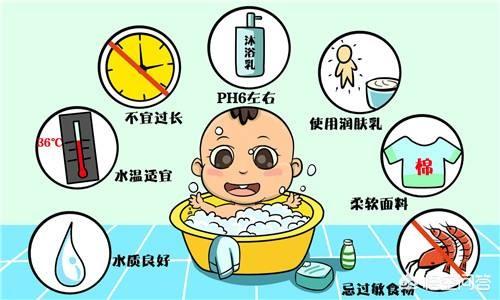
5. Baby Hand Care
The mother should cut the baby's nails short to avoid the baby scratching the buns and causing secondary infections.
6. Use of medication
It is best not to treat newborns with desensitizing medications, and if your baby's eczema is recurring, parents can use medication under the guidance of a doctor.
The incidence of eczema in newborns is very high and can be said to bother most parents.
Eczema can be caused by a variety of reasons, from food-borne allergies to environmental allergies, and from heredity. Most cases of eczema will slowly recover around the age of two.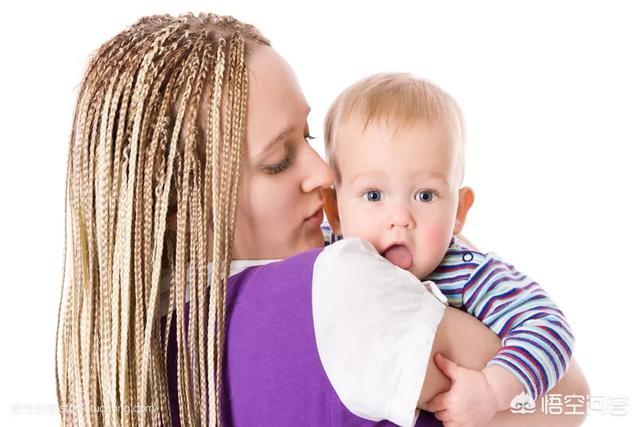
No matter which type of eczema we have, it is important to take care of it.
There are five primary areas of care:
1, less to wash the child's face
In particular, do not use too hot water to wash your face, it is not recommended to use shower creams or soap to the child to wash, because hot water will stimulate the child's eczema more itchy, the general advice morning and evening will be lukewarm water to wash your face can be, or even a little bit of cold water to stimulate the better.
2、Prevent external stimulation
Do not have some plush toys on the bed, children have bedding with attention to sterilization. The child's clothes should be pure cotton.
3. Pay attention to the humidity and temperature in the air
Indoor air temperature and humidity should be taken care of, try to control the temperature at 20-24 degrees, humidity control at about 40 to 60 degrees, which is better for the retention of moisture in the child's skin, as well as for the integrity of the child's skin.
4. Breastfeeding mothers pay attention to their diet
Eczema may be related to food allergies, mothers keep a dietary diary to observe what they eat, the child's eczema will be more serious, then we must reduce or even do not eat this kind of things, which can reduce the incidence of eczema in babies!
5. Use moisturizer
Take care to use creams, just the ones for babies, get the big bottles and rub on a thick layer, a layer that can be seen on the skin, to help prevent external irritation and protect the skin.
Are you learning more about baby eczema?
I'm Anna's mom. This article was originally written.
Anna mom, mixed in the parenting world of physicians, pharmacists, nutritionists, counselors quadruple creature, the family has Anna girl, the original creators of various platforms, hope to give anxious moms a little support and help.
My son had eczema on his face within days of being born. At first I wasn't sure what it was because the traits were very similar to adults who grow acne. Since I am a nurse and have some medical knowledge, I learned a lot more about eczema, neonatal acne, and atopic dermatitis.
During the course of my studies, I realized that eczema on the face is mostly due to two things. The first is dryness and the second is hormone levels (more common in boys).
When my son's face was at its worst, he had acne-like pimples all over his face, densely packed, especially on his forehead. But I also insisted on not using eczema cream, just wipe some baby baby cream, think up wipe, think not even then. Parents should also pay attention to hygiene Oh, do not wear sweater, wool fiber clothing contact with the child, try to wear cotton clothing, to avoid stimulation of eczema. Maintain indoor temperature and humidity, dry in winter, it is recommended to spray water on the curtains to enhance humidity, this method works.
If the eczema is caused by hormone levels, it's just a process, like a viral cold, with or without medication and injections, it's all about going through that process. The baby is now 4 months old and is almost well, and will soon become a watery little baby.
Eczema is a type of allergic dermatitis and is the most common rash in infantsspecificitiesIs:
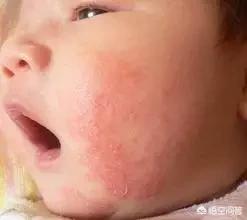
1:Dry skin, when you touch dry skin with your hand, you will feel small white bumps.
2:There are dry patches, dry white and red scaly lumps appearing anywhere on the body.
3:It can come on suddenly, especially in winter when the skin is more sensitive.
To help the babystop an itchIt is possible to use
1:- Hydrocortisone Ointment. Apply hydrocortisone ointment to itchy skin during eczema flare-ups.
2:Oral antihistamines. Both over-the-counter (e.g., benadryl) and prescription medications are available, which are effective in relieving itching, especially at night.
3:Cut baby's nails short and clean them regularly. Prevent your baby from scratching himself.
Baby with eczemaregular careIt is very important and requires mom to pay attention to moisturizing in all aspects of her life details:
1:Don't let the water temperature be too high when you take a bath, lukewarm water is fine.
2:Don't let your baby do bathing in soapy water or bubble baths.
3:Gently pat the skin dry with a towel without rubbing.
4:Keep the humidity in your home around 40%, you can buy a hygrometer. Use a humidifier in winter.
5:Don't buy clothes made of wool and chemical fiber materials, which can cause skin irritation.
6:Use cotton sheets and soft face masks.
7:Wash clothes with a mild colorfast, unscented detergent. Do not use fabric softener.
8:Prevent skin sunburn, give the baby to apply sunscreen lotion, the best good chemical sunscreen.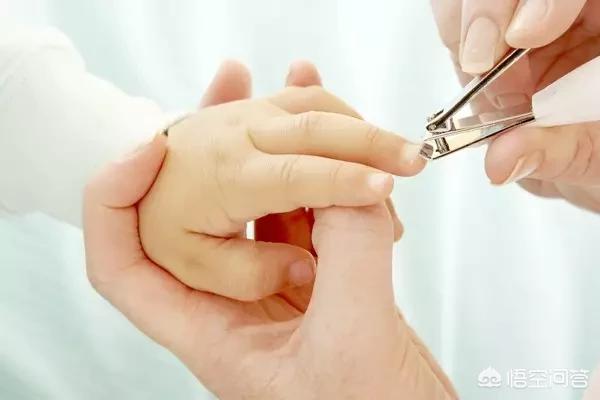
Be sure to check for allergens.
1:Food Allergies: The six most common allergy-prone foods are dairy products. These include milk, yogurt, cheese, butter and eggs, soy, peanuts, fish, and wheat products.
2:Breastfeeding mothers avoid these foods for two to three weeks to see if the baby gets better. If you are on formula, switch to another one and see.
3:Environmental allergies, dust, fungus pets and pollen, etc., do not directly cause eczema, but can act as a catalyst for it.
Reference Hills Encyclopedia of Parenting
Baby face with eczema not only looks ugly, more difficult is that the baby may be unbearable because of itching and scratching or rubbing, so the baby has eczema, parents must take care of it, the specific method can be done from the following aspects:
1. Eczema parts can only be cleaned with water, clean and apply baby lotion.For example, the domestic Yu M Net can relieve itching by moisturizing the skin. However, Yu M Net contains fragrances, and we recommend Silk Tiff, which has no odor and is specifically designed for skin problems.
2. Ensure that your child's hands are hygienic and that his or her nails are cut short.Avoid children scratching their faces because of itching.
3. don't overdress your child.Wearing too thick clothes also tends to cause eczema in babies. So children should be dressed moderately and not overheat, especially in heated rooms in the north in winter.
4. baby eczema, the mother's diet as light as possible, do not eat easy to cause allergies to food.For example, fish, shrimp, and other seafood that can cause allergies.
5. If the baby eczema is serious, parents must take the child to the hospital to see a doctor, under the doctor's orders for medication, prohibited at home to the child's medication, a lot of coated medicine is likely to contain hormones.
Eczema is a condition that occurs in infants due to the underdevelopment of their intestinal tracts.But this phenomenon will slowly disappear as the child grows older in months.My daughter's eczema disappeared completely after four months, and in some cases it may go away slowly around the age of one. If your baby's eczema is just a few on the face, moms can take care of it meditatively and it will slowly clear up!
Eczema is very common in children and is seen as itchy, oozing, and crusting of the skin, and is now considered to be an allergic reaction.
When a child with allergies is first exposed to an allergen, such as milk powder, the body's plasma cells will produce a corresponding specific antibody, and when this specific antibody accumulates to a certain amount, if it is exposed to the antigen again, the specific antibody will combine with it.
degranulation of mast cells of the organism.A variety of mediators are released, causing capillary dilatation, increased permeability of the vascular wall, smooth muscle contraction, and increased glandular secretion. If it occurs in the skin, redness, swelling, hives, eczema and itchiness appear.
In terms of treatment, the allergens should be identified. If it is related to milk powder, amino acid milk powder and deeply hydrolyzed milk powder can be used, which will improve quickly.
If still not relieved, use Chinese medicine (personal experience, the effect is better):
Groundnut seed, snakebeds, bitter ginseng, pepper, two flowers forsythia, amaranth, Xiaku Cao, each 10 grams, with 500 ml of water into 300 ml of external application, twice a day, for three days.
Recommending this great method to everyone, I hope it helps!。
Overheating while sleeping indoors.
Back in my day, one was to find the cause of high room temperatures, remove the cause and keep the room cool, and the other was to apply prickly heat powder to my face to keep it cool.
Eczema, also known as "ringworm".
Eczema is a common, allergic skin inflammation caused by internal and external factors. It usually begins in the second or third month of life and is an acute or subacute form of eczema that occurs on the head and face of infants.
The main symptoms of eczema appear as erythema, rice-like papules, herpes, vesicles, oozing and crusting on the surface of the skin, with obvious inflammatory reaction and localized burning sensation and itchiness of the skin. Usually in the baby's head, cheeks, external ears, and can even spread throughout the face and neck, severe hands, feet and chest and abdomen can be seen.
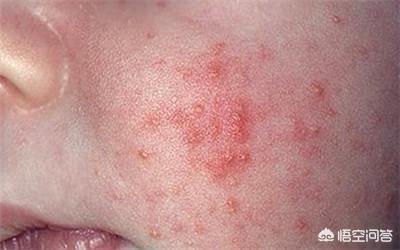
Baby eczema dietary attention
What can't babies eat for eczema? It is best to find the allergens first.
If your newborn has eczema, then breastfeeding mothers should be careful to try to consume the following foods:
Avoid allergenic food. If allergenic foods are found in the diet, such as fish, shrimp, crab, beef and mutton, chicken, duck, goose, pollen and other causes, these foods should be completely contraindicated, so as not to cause a perverse reaction, resulting in eczema recurrence or aggravation of the condition.
Can babies with eczema still be breastfed?
Eczema is an abnormal skin phenomenon, but not necessarily just a skin problem. In infants and young children, allergies are a common cause of eczema. Cow's milk allergy is the leading cause of allergy in infants and young children, and this is related to having received infant formula more or less early in life. Exclusive breastfeeding should be practiced exclusively after birth, as long as the newborn has not lost more than 7% of his or her birth weight.Formula powder should not be added too early.' Persistence' is so important!
How does a mom with an eczema baby eat?
Severe eczema in infants should be limited to the type of food mom eats if breast milk is suspected to be involved. The mother should eat only staple food + green vegetables, and at the same time give the baby hormone + antibiotic ointment to treat severe eczema. After the eczema has improved, the mother starts to resume food one by one, and observes each food for three days after adding it. If the eczema does not recur, it means that the mother can eat this kind of food, otherwise, stop eating it for at least three months.
Only after the mother has restricted her diet without any effect can she consider suspending breastfeeding and adding amino acid formulas for diagnostic treatment. 2-4 weeks later, when the situation has improved significantly and the mother switches to breastfeeding again, and the situation worsens significantly, can she consider discontinuing breastfeeding and switching to amino acid deeply hydrolyzed formulas. This is rare.
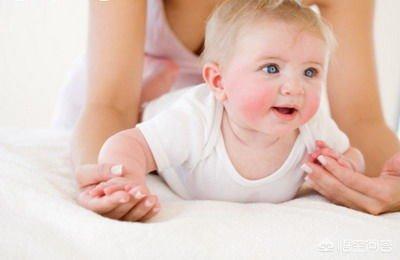
Can I still take formula if I have eczema?
Formula was taken for the first two months of life without problems such as eczema; when it was taken again some time later, head and face redness and large areas of eczema appeared. The whole process is typical of IgE-mediated sensitization. Initial sensitization (IgE increase in the body, but not yet symptomatic); a few months later re-exposure to symptomatic allergy. At this point, if powdered formula must be added, only amino acid formulas or deeply hydrolyzed formulas should be added.
Can babies with eczema eat whole eggs?
Whole eggs are not recommended for infants under one year of age. For infants only 9 months old, only rice flour, rice porridge or noodles are acceptable, and then pureed vegetables, pureed meat, pureed egg yolk, etc. are acceptable. If, after the addition of any of the complementary foods, there is an increase in skin eczema, vomiting, diarrhea, etc., the addition of this food should be suspended for at least 3 months. Understanding of food: A food that is nutritious for one person may be a toxin for another.
Does eczema still affect the body when it clears up?
Is eczema scary? Many people think that eczema is not scary. Many babies have eczema and it clears up on its own as they grow older, after the age of one. This is very incorrect. In terms of eczema itself, it does get better after the age of one, and many will go away on their own. However, the allergy trilogy - skin + gastrointestinal manifestations; upper respiratory to lower respiratory manifestations - warns us that improvement in eczema does not mean that the allergy is gone, but perhaps in progress.
What is the treatment for severe eczema?
Principles of treatment of severe eczema:
1、Find allergens from life and quit in time. Common allergens are milk, eggs, soybeans and shelled seafood. If milk allergy is suspected, for infants, diagnostic treatment using amino acid formula for 2-4 weeks to determine the cause of allergy.
2、Local hormone + antibiotic treatment. Severe eczema often has local secondary infection, for example: hydrocortisone + erythromycin topical application.
Can babies with eczema be vaccinated?
Children with recurrent eczema should first look for the cause, is it related to food allergy? Eliminate the cause in order to relieve eczema at all. Then, use topical medication to control the skin changes of eczema. In fact, children with eczema can be vaccinated as long as they have intact skin and are not allergic to vaccines. Note: For milk allergy, do not take OPV, but change to IPV; for egg allergy, be cautious of influenza vaccine and some rabies vaccines.
How to take care of pus in eczema?
Eczema that is flaky, fissured, or oozing should only be treated topically with hormone + antibiotic creams. Other eczema creams should only be used when the skin damage has largely healed. Don't be afraid of topical hormones. Localized skin pigmentation after using hormones is a misunderstanding of hormones. The less active the use of topical hormones, the heavier the eczema, the longer the duration, the more localized hyperpigmentation will occur. Different types of drugs, dosage and frequency of use should be considered according to the degree of lesions in different parts of the body. For facial, especially perioral eczema, the medication should be applied after the child is asleep to minimize the chance of eating into the mouth. Many stubborn eczemas are insensitive to hormones because the lesions have been complicated by bacteria and other infections. Therefore, it is recommended to mix corticosteroids with antibiotics, which are very effective. But the cause of eczema can not be solved by topical hormones after all, so it is also necessary to look for the cause of eczema, such as milk allergy. Only by removing the causes in time can eczema be cured and recurrence avoided.
If my answer is helpful to you, please pay attention to [DrX Health Science] Oh, you want to know the science of feeding, parenting tips, family education, disease care and so on can find the answer here.

This question and answer are from the site users, does not represent the position of the site, such as infringement, please contact the administrator to delete.